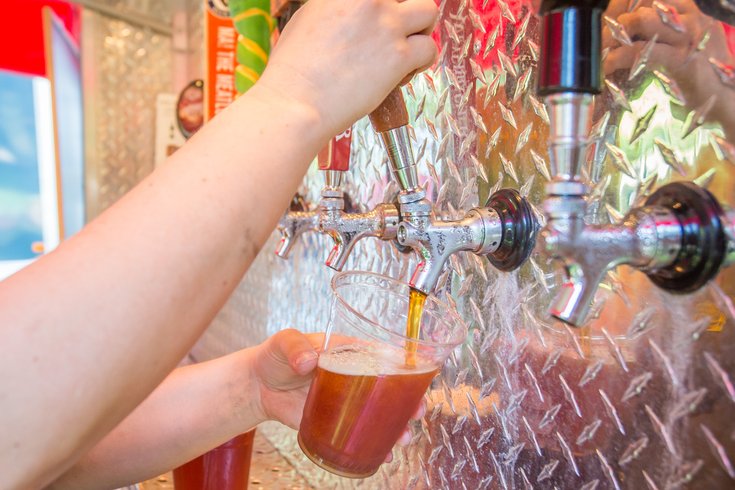
January 09, 2024
 Thom Carroll/for PhillyVoice
Thom Carroll/for PhillyVoice
For those trying to cut down on drinking in the new year, a scientist at the National Institute on Alcohol Abuse and Alcoholism offers some tips.
As the booming no-alcohol beverage industry and online trends suggest, more Americans are reexamining their relationships with alcohol.
A recent survey suggests that nearly a quarter of people surveyed in the U.S. subscribe to a sober curious lifestyle, actively questioning when and why they drink and either moderating consumption or kicking the habit entirely. Posts with #sobercurious have garnered over 813 million views on TikTok, an interest reflected in spending habits — between August 2021 and 2022, sales of non-alcoholic versions of beer, wine and spirits shot to $395 million, marking a year-to-year growth of over 20%.
RELATED: New Kensington bar creates a space for people who love cocktails but don't want to drink alcohol
The benefits of drinking less are well-documented. Cutting back on alcohol can lead to better sleep, better skin and lower blood pressure, among other positive health outcomes. According to Dr. Aaron White, a senior scientific advisor for the National Institute on Alcohol Abuse and Alcoholism, it can take as little as a week for the benefits to show up in one's body.
"Alcohol begins to take a toll on health at far lower doses than once thought," White said via email. Dietary guidelines in the U.S. define moderate consumption as one serving of alcohol per day for women and two per day for men. Even at this volume, drinking is associated with elevated levels of the liver enzyme gamma-glutamyltransferase, or GGT, which is present when there is inflammation or damage to the liver.
"Elevated GGT is predictive of developing insulin resistance, heart disease, cancer and other conditions," White said. "Fortunately, levels of GGT and other elevated liver enzymes start to drop during the first week or two of abstinence."
So what's the best way to turn your curiosity about going alcohol free into action? Whether you're currently participating in a Dry January challenge or trying to quit completely, here are some tips from White on reducing alcohol consumption:
Taking note of when you drink makes it easier to identify situations where you might be tempted to overindulge. The practice also makes it easier to visualize progress and maintain motivation. Try keeping a journal, with notes on when you drank, how much and how you felt at the time. Any pen and paper will do, but there also are also apps, like Less and Reframe, that can be used to log alcohol consumption.
Many people feel pressured to drink at social gatherings with alcohol, like parties or bar meet-ups. But having a plan in place ahead of time can make navigating the situation less stressful. Ask yourself: How much do I want to share with others? And if you are not quitting, merely reducing: How much am I comfortable drinking?
"Some people prefer to simply tell people they are not drinking," White said. "Others prefer not to openly discuss it and to carry a cup with a non-alcohol-containing beverage to reduce the chances anyone will ask if they want a drink. For people who want to cut back but not abstain completely, it could be helpful to decide beforehand how many drinks is acceptable to you and sticking to that level."
Changing old habits can be hard, even for moderate drinkers. Experts like White say it's important to be patient and compassionate with yourself, especially if you go over your new limits or have a drink when you're trying to quit.
"Try not to be too hard on yourself if you can't stick perfectly to the plan," he said. "Drinking patterns can develop over many years, so it isn't surprising they can be hard to change. And don't forget there are lots of resources available to help if it turns out cutting back or quitting is harder than expected." White recommends the NIAAA's Rethinking Drinking hub, which includes worksheets and links to support groups.
The cost of cocktails adds up. Calculating how much money you've saved each week or month from drinking less (or not at all) can create a sense of accomplishment and provide a motivational boost. It also can be a reward. White suggests spending the money on an "alternative" activity you enjoy that doesn't involve drinking. That could be a show, a nice meal out with friends or the sport of the moment, pickleball.
For some people, a trained professional is the best resource for changing a relationship with alcohol. A conversation with a primary care doctor during a routine physical exam can be productive. Speaking to a therapist virtually or in person also can help identify underlying reasons for drinking — and come up with better plans to stop it. Psychology Today and Good Therapy maintain free lists of therapists categorized by city; if you have health insurance, you can search for in-network counselors online through your provider.
"The important thing is that people are willing to make changes and to keep trying until they find something that works best for them," White said.
Follow Kristin & PhillyVoice on Twitter: @kristin_hunt
| @thePhillyVoice
Like us on Facebook: PhillyVoice
Have a news tip? Let us know.